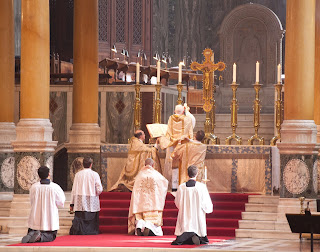2001: A Space Odyssey and Tree of Life
Over the weekend I sat down to watch Stanley Kubrick's 2001: A Space Odyssey with my wife, who was seeing it for the first time. Depending on which critic you read, the movie is either a masterpiece of deep philosophical questioning, or a vastly overrated mishmash of half-baked ideas that runs much too long. In my opinion, the movie falls someplace between these extremes.
Most people vaguely remember a few discrete scenes, such as the apes at the beginning, or The Blue Danube playing as the space shuttle docks with the station, or "Open the pod bay doors, HAL." But the small details really impressed me with this latest viewing- all of the costume designs, the color palette, how the visual effects still look good. Mostly, one can't help marveling at the absolute perfection of Kubrick's execution of all the audio and visual elements into a complete sensory experience.
And yet, for all the brilliance on display, the plot ultimately fails to hold up under close examination. Contemporaneous interviews with Kubrick and Arthur C. Clarke (who wrote the screenplay as well as the novel at the same time) explain how they wanted to leave the meaning of the monolith and HAL's betrayal ambiguous. Accepting that, even so, lots of details are simply unexplained and offer no resolution. Is the monolith "real", or just a metaphor? If it is indeed real, then the final summary of the plot would simply be, "The evolution of consciousness is a project of an alien race." But who are these aliens? And why do it? Are the aliens God, or for all intents and purposes beings that could be reasonably called "gods"?
Was HAL actually malfunctioning, or was it a clever lie to get the two crewmen outside the ship so he could kill them? But if that's the case, why didn't he kill Dave Bowman on his first space walk, instead waiting until Frank Poole made the second trip? What was HAL's motivation ultimately- to complete the secret mission that Bowman and Poole were unaware of, or to prevent the mission from succeeding? Was HAL somehow "evolved" into more than a mere computer program, as is implied?
And this doesn't even touch on the Star Gate / Star Baby ending, which is visually dazzling even today, but appears immune to logical analysis. Most people say, "Something something evolution something something higher states of consciousness," and really that's about all you can say. It really is finally only about something something evolution/transcendence and not an explanation of what that means or how it works or what finally is the fate of Dr. Dave Bowman, aka Star Baby. Did Kubrick and Clarke even have a clear idea what they were trying to show?
So I fall into the camp of people who are less than impressed by the plot (or more aptly, the narrative). But I still love the movie. Why?
My wife and I both thought of Terrence Malick's Tree of Life as we discussed the movie later. Malick's movie is very obviously impressionistic- there's no "story" to the movie, rather, you are treated to memories and sensory impressions of a character thoughout his life, and into the afterlife.
And how emotionally powerful it is! Malick presents the best cinematic effort to convey the disjointed nature of our perceptions of self, and others, filtered through memory, I have ever seen. Sean Penn's character is full of fleeting images, remembrance of things past, if you will, particularly of his father- his deep love for him and also pain at his remoteness. His mother's essentially unlimited love for him and how mysterious this is but also, finally, what waits for him after death. I was profoundly moved by this film, in no small part because my own father had recently died.
Like the Star Baby sequence in 2001, Tree of Life has a fantastic (in the literal sense) digression into a view of the creation of the world and the emergence and evolution of life on it. Most people just remember "that weird part with the dinosaurs" and they're not wrong. It is a weird part that has dinosaurs in it.
This sequence is analogous to the opening of 2001, in obvious ways. The purpose is very different, however- Malick needs to convey the idea that our personal experiences are somehow connected to being itself, which we share with all creatures and is perhaps a cosmic reality. Kubrick uses the intervention of the monolith as the beginning of humanity and its 4 million year progress until the next monolith appears to start the next journey of consciousness.
2001 has more of the trappings of a traditional movie. There are named, recognizable characters who perform actions in a logical way. Yet like Tree of Life, Kubrick is using all of the audiovisual tools in film to create in the viewer a sense of the inscrutability of our mental abilities, and what may possibly come when they are transcended.
Lots of people found Tree of Life boring, in the same way that lots of people found 2001 "just some crappy movie for drugged up hippies." I can understand that; and I don't think everyone who feels this way "just doesn't get it, man." Art of a certain kind resonates with some people and not others.
In both films, narrative is secondary to other aspects of the medium, and lots of folks just want a good story. There are connections between seemingly unconnected scenes, but the link isn't simply a matter of chronology or the action-consequence chain. Rather, the connection is something that arises inside the viewer in the realm of our emotions and intuitions.
Lately I've stopped watching movies and television, suffering burnout at the latest hectoring from our cultural betters, with attendant explosions and CGI-stuffed action scenes. It's been nice to watch these films that are slower paced and ask some attention from the audience.










Comments